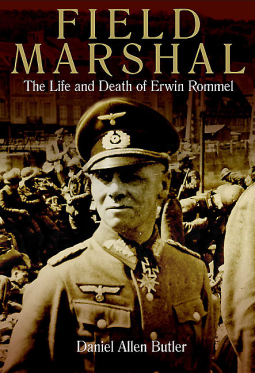
FIELD MARSHALL
The Life and Death of Erwin Rommel
by DANIEL ALLEN BUTLER
This title was previously available on NetGalley and is now archived.
Send NetGalley books directly to your Kindle or Kindle app
1
To read on a Kindle or Kindle app, please add kindle@netgalley.com as an approved email address to receive files in your Amazon account. Click here for step-by-step instructions.
2
Also find your Kindle email address within your Amazon account, and enter it here.
Pub Date Aug 19 2015 | Archive Date Sep 20 2015
Casemate Publishing | Casemate Publishing
Description
And yet for all his military genius, Rommel was also naive, a man who could admire Adolf Hitler at the same time that he despised the Nazis, dazzled by a Führer whose successes blinded him to the true nature of the Third Reich. Above all, he was the quintessential German patriot, who ultimately would refuse to abandon his moral compass, so that on one pivotal day in June 1944 he came to understand that he had mistakenly served an evil man and evil cause. He would still fight for Germany even as he abandoned his oath of allegiance to the Führer, when he came to realize that Hitler had morphed into nothing more than an agent of death and destruction. In the end Erwin Rommel was forced to die by his own hand, not because, as some would claim, he had dabbled in a tyrannicidal conspiracy, but because he had committed a far greater crime – he dared to tell Adolf Hitler the truth.
In Field Marshal historian Daniel Allen Butler not only describes the swirling, innovative campaigns in which Rommel won his military reputation, but assesses the temper of the man who finally fought only for his country, and no dark depths beyond.
A Note From the Publisher
Notes
WE DO NOT OFFER KINDLE FILES FOR FREE DOWNLOAD. PLEASE NOTE THIS FILE AVAILABLE FOR FREE DOWNLOAD IS A PDF- NOT A KINDLE FILE, AND IT MAY NOT WORK WITH CERTAIN KINDLE DEVICES, AS IT IS NOT A KINDLE FILE. KINDLE FILES WILL BE FOR SALE VIA AMAZON.COM
WE DO NOT OFFER KINDLE FILES FOR FREE DOWNLOAD. PLEASE NOTE THIS FILE AVAILABLE FOR FREE DOWNLOAD IS A PDF- NOT A KINDLE FILE, AND IT MAY NOT WORK WITH CERTAIN KINDLE DEVICES, AS IT IS NOT A KINDLE FILE. KINDLE FILES WILL BE FOR SALE VIA AMAZON.COM
Marketing Plan
Trade, library and direct-audience review mailing to local, regional and national
publications
• Catalog and website advertising
• Direct-mail and internet promotion
• Simultaneous launches in the US and UK
• Sales presentations to all major chain stores, select local bookstores, national catalog
booksellers and book clubs
Available Editions
| EDITION | Hardcover |
| ISBN | 9781612002972 |
| PRICE | $32.95 (USD) |
Average rating from 7 members
Readers who liked this book also liked:
William W. Johnstone; J.A. Johnstone
General Fiction (Adult), Historical Fiction
Silvia Moreno-Garcia
Historical Fiction, Literary Fiction, Sci Fi & Fantasy










